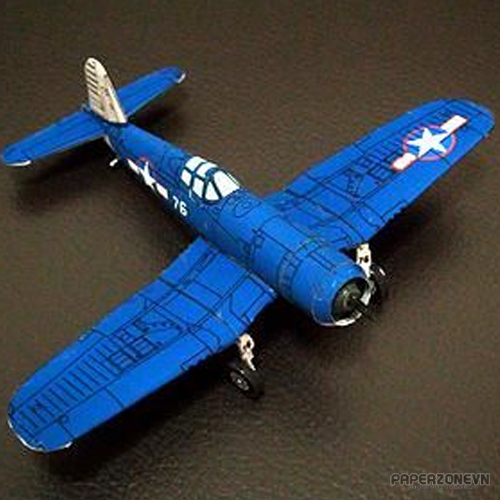- Thumbnail
-

- Resources
- Received from the internet.
- Author
- Unknown.
- Printed File Format
- Page(s)
- 3
- Instruction Format
Jet Fighter WWII VMF-215 Vought F4U-1 Corsair Fighter Papercraft
Other problems were encountered during early carrier trials. The combination of an aft cockpit and the Corsair's long nose made landings hazardous for newly trained pilots. During landing approaches, it was found that oil from the opened hydraulically-powered cowl flaps could spatter onto the windscreen, severely reducing visibility, and the undercarriage oleo struts had bad rebound characteristics on landing, allowing the aircraft to bounce down the carrier deck. The first problem was solved by locking the top cowl flaps in front of the windscreen down permanently, then replacing them with a fixed panel. The undercarriage bounce took more time to solve, but eventually a "bleed valve" incorporated in the legs allowed the hydraulic pressure to be released gradually as the aircraft landed. The Corsair was not considered fit for carrier use until the wing stall problems and the deck bounce could be solved.

Other problems were encountered during early carrier trials. The combination of an aft cockpit and the Corsair's long nose made landings hazardous for newly trained pilots. During landing approaches, it was found that oil from the opened hydraulically-powered cowl flaps could spatter onto the windscreen, severely reducing visibility, and the undercarriage oleo struts had bad rebound characteristics on landing, allowing the aircraft to bounce down the carrier deck. The first problem was solved by locking the top cowl flaps in front of the windscreen down permanently, then replacing them with a fixed panel. The undercarriage bounce took more time to solve, but eventually a "bleed valve" incorporated in the legs allowed the hydraulic pressure to be released gradually as the aircraft landed. The Corsair was not considered fit for carrier use until the wing stall problems and the deck bounce could be solved.

Sponsored: Google Advertising
Attachments
Last edited by a moderator:
